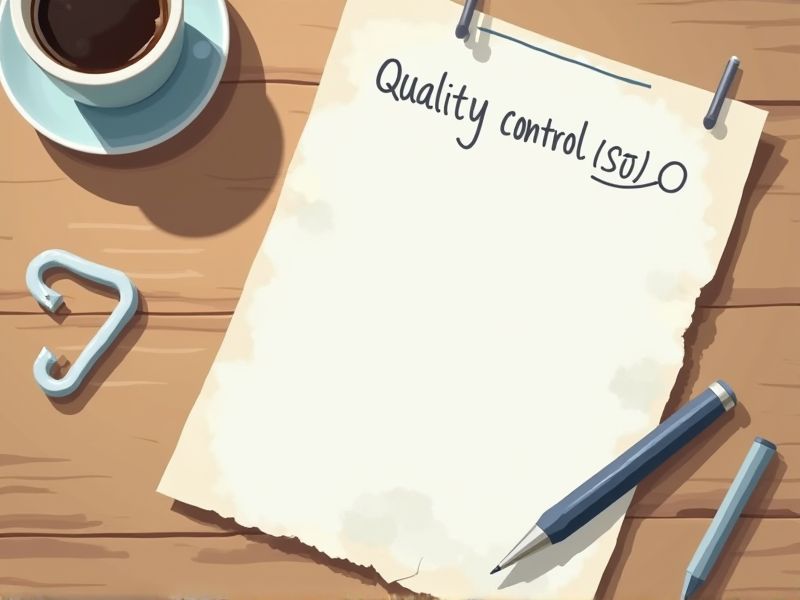
Quality control specialists play a pivotal role in ensuring products meet industry standards, necessitating a thorough understanding of specific quality frameworks and methodologies. Certain certifications validate this expertise, aligning professionals with industry best practices and enhancing their problem-solving capabilities. Moreover, these credentials often boost career prospects by demonstrating a commitment to continuous learning and adherence to industry regulations. Here are some essential certifications you may need for a Quality Control Specialist.
Certified Quality Engineer (CQE)
The Certified Quality Engineer (CQE) credential ensures a comprehensive understanding of quality principles and statistical methods, which enhances a quality control specialist's ability to implement rigorous quality management systems. It signifies a mastery over quality auditing methodologies crucial for evaluating operational efficiencies and compliance. The CQE certification provides an edge in problem-solving skills, essential for identifying and mitigating potential production issues. Continuous education required for CQE certification maintenance keeps a quality control specialist updated with the latest industry standards and practices.
Certified Quality Auditor (CQA)
A Certified Quality Auditor (CQA) possesses expertise in assessing and improving quality systems, thereby enhancing a quality control specialist's ability to ensure consistent adherence to standards. The CQA certification provides the specialist with a deeper understanding of audit processes, improving the detection and rectification of non-conformities. Data from industry studies often show that CQA-certified individuals contribute significantly to reducing error rates, leading to more efficient production processes. As industries increasingly demand rigorous quality assurance, CQA certification equips specialists with the skills to effectively manage and improve quality within an organization.
Certified Manager of Quality/Organizational Excellence (CMQ/OE)
The Certified Manager of Quality/Organizational Excellence (CMQ/OE) enhances a quality control specialist's ability to streamline processes by providing in-depth knowledge of quality improvement methodologies. This certification signifies a high level of proficiency in leadership and management, crucial for implementing effective quality control systems. A specialist with CMQ/OE certification is equipped to drive organizational transformation, ensuring sustained quality standards. As businesses prioritize quality and efficiency, the CMQ/OE credential positions specialists as key contributors to strategic decision-making and continuous improvement initiatives.
Certified Quality Improvement Associate (CQIA)
Certifying as a CQIA provides a structured understanding of continuous improvement principles, which enhances the ability of a quality control specialist to identify and eliminate inefficiencies. The certification equips professionals with tools and techniques necessary for effectively analyzing data, thereby assisting in making informed decisions to improve product or process quality. Employers recognize the CQIA as a standard of proficiency, which can lead to greater trust and responsibilities assigned to the quality control specialist. Holding a CQIA can lead to career advancement opportunities due to the demonstrable commitment to professional development and enhanced problem-solving skills.
Certified Quality Technician (CQT)
A Certified Quality Technician (CQT) provides specialized skills in inspecting and testing products, ensuring consistency and adherence to quality standards. This certification equips professionals with the ability to effectively analyze quality issues and implement corrective actions, thereby enhancing operational efficiency. Employers benefit from the expertise of CQTs as they help reduce defects and waste, contributing to cost savings. It also boosts an organization's reputation by maintaining high product quality, thereby meeting customer satisfaction and compliance requirements.
Six Sigma Green Belt Certification
Quality control specialists with a Six Sigma Green Belt Certification can effectively use data-driven methodologies to improve process efficiency. The certification provides the necessary tools to identify and eliminate defects within business processes. Enhanced knowledge in statistical analysis enables specialists to make informed decisions, reducing variability and improving product quality. Organizations benefit from reduced operational costs and increased customer satisfaction by employing certified professionals.
Six Sigma Black Belt Certification
Six Sigma Black Belt Certification equips quality control specialists with advanced statistical tools, directly improving process efficiency and reducing defects. The certification encourages a data-driven approach, which leads to informed decision-making and enhanced operational performance. With project management skills, specialists can effectively lead teams towards continuous improvement efforts. Organizations benefiting from these skills often experience decreased costs and increased customer satisfaction due to higher quality standards.
Lean Six Sigma Certification
Lean Six Sigma certification equips quality control specialists with a structured methodology for identifying and eliminating inefficiencies in processes, which directly improves product and service quality. Organizations implementing Lean Six Sigma practices often experience reduced operational costs and improved customer satisfaction, making these skills highly valued. Certification ensures that specialists possess a standardized set of tools for measuring performance and driving continuous improvement. Demonstrating this credential can enhance job prospects and career advancement opportunities for professionals in the quality control field.
ISO 9001 Lead Auditor Certification
ISO 9001 Lead Auditor Certification enhances a Quality Control Specialist's ability to assess and improve quality management systems effectively. Acquiring this certification builds credibility and trust with stakeholders by demonstrating a thorough understanding of international quality standards. It equips specialists with the skills to conduct audits that identify potential areas of improvement and ensures compliance. This certification can lead to improved job prospects and career advancement due to the high demand for skilled quality auditors in various industries.
Certified Reliability Engineer (CRE)
A Certified Reliability Engineer (CRE) brings specialized knowledge in ensuring products consistently perform as intended, which reduces failure rates and enhances overall product quality. Their expertise in reliability analysis techniques helps identify potential issues early, preventing costly recalls and improving customer satisfaction. Integrating a CRE into a quality control team ensures that reliability processes are embedded within product development, strengthening the overall quality management system. As industries increasingly prioritize product longevity, a CRE's skills in life data analysis and reliability testing become vital in staying competitive.
Summary
When you, as a quality control specialist, acquire certifications, your expertise gains validation, enhancing your credibility in the industry. This often leads to better job prospects and potential career advancements within your field. Certified skills contribute to more efficient problem-solving and improved quality processes in your work environment. Organizations tend to benefit from decreased error rates and increased customer satisfaction due to your enhanced competencies.
